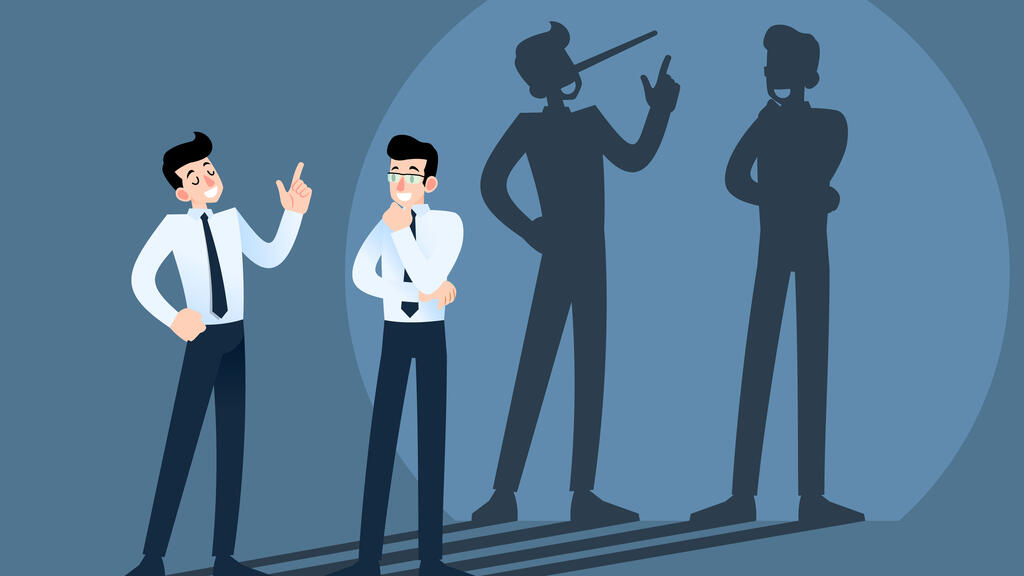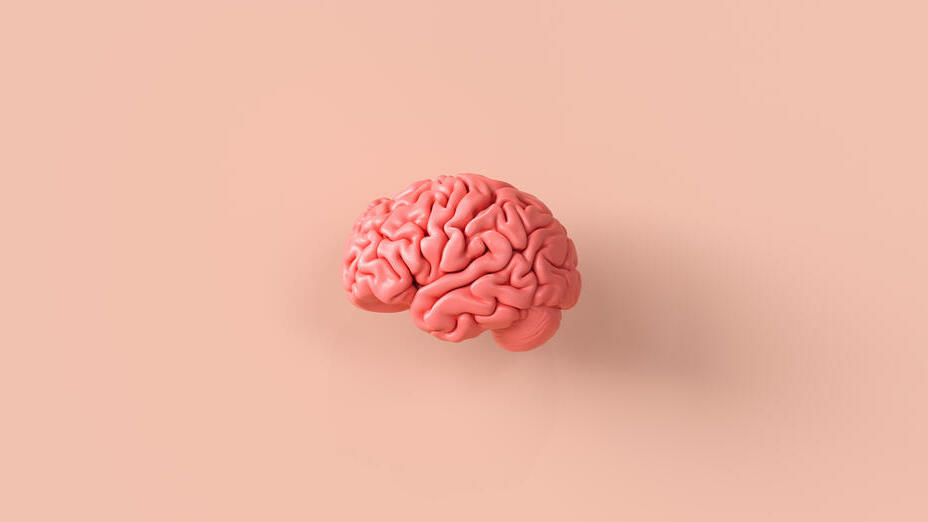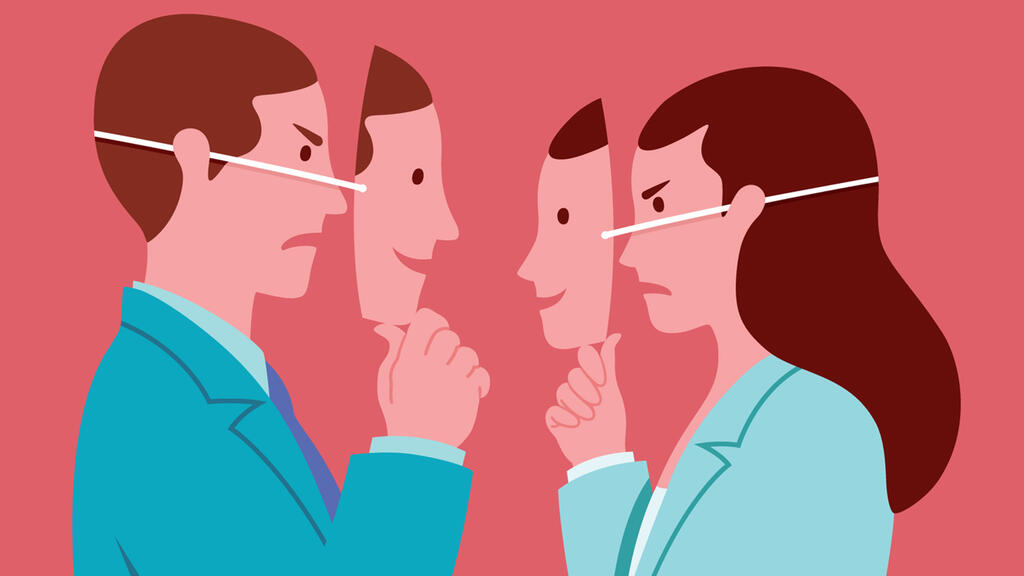Getting your Trinity Audio player ready...
Deception provides survival benefits for many animals. It can improve their chances of finding a mate, save them from the jaws of a predator or help them beat their competitors to a meal.
Sometimes it seems that wherever life is there are lies. Humans also often lie, and use lies for diverse purposes. If so, is lying inherent in us?
In his book “Born Liers”, journalist Ian Leslie claims not only that humanity cannot live in a world without lies, but that deception was a major instrument in our evolution. According to him, the invention of lying was based on two key elements in human essence: the need to survive and the need for company.
Similar to other organs in the human body, the human brain also developed in a manner that provides an evolutionary advantage for the individual’s reproduction. During evolution mental abilities were prioritized to help us spread our genes, and those found unbeneficial - were discarded.
According to philosopher and researcher of human nature David Livingstone-Smith, author of the book “Why We Lie”, honesty and reproductive success do not always go hand in hand. As deception helped us in the struggle for survival and the spread of our genes, natural selection made it an inseparable part of our existence.
“We are animals that deceive because of the fruits that deception bore for our ancestors, and those that we still reap from it today,” he wrote.
Animals deceive using colors, optical illusions or mimicry. Humans mainly deceive using the unique instrument of humanity - language.
However, evolution has led us to a paradox of sorts. It has granted us an instrument for communication that seemingly opens a particularly easy path for manipulation and abuse, but at the same time, it does not allow us to make use of its full potential, due to moral or social reasons.
It is clear to us that lying may lead to a breach of trust and to a serious conflict with the person to whom we lied, and yet we lie.
What motivates us to expose ourselves to the possibility of mistrust and tarnishment of our reputation, and to risk business and personal relationships? Even if we take away fraud, impersonation and criminal activities, we all lie - lying is a much more normal and normative phenomenon than we wish to admit.
Studies show that the reasons for lying are many and diverse, but they can be divided into two main categories: reward and punishment. We lie in order to obtain a positive outcome that would benefit us, such as praise, success or reward, or in order to spare ourselves a negative outcome, such as unpleasant feelings, embarrassment, damage to our status or punishment.
Thought fallacies also encourage us to lie. For example, Present Bias, that is, the human tendency to prefer certainty in the short term over a better outcome in the future, supports the choice to lie and to prefer the immediate gain that the lie provides over the risk that the lie will be revealed later on.
Although we do not lie all the time, we lie a lot - much more than we are willing to admit, even to ourselves. Lying allows us to navigate the turbulent waters of the social and occupational world. In many ways, it is our lifeboat.
Skilled liars have higher self-confidence, they earn more money, attain a higher social status and even enjoy greater sexual success compared to poor liars - although they may also be lying regarding this matter when answering questionnaires in studies.
We start developing our deception skills already in infancy, studies have found that already at the age of six months, babies fake crying and examine their surroundings to see whether it works. This is how we begin polishing our lying skills even without language and words.
Later in life, we perfect our deception skills to such an extent that we even manage to deceive ourselves and believe our own lies. We tell ourselves that this is the last cigarette, that tomorrow we will start dieting and so on and so forth.
Signs of high lying skills can be found in our distant relatives, the apes. For example, primatologists Richard Byrne and Andrew Whiten described an incident in which two young chimpanzees were observed digging in the ground in search of food they had buried earlier.
When they noticed an adult chimpanzee approaching they stopped digging, moved away and began scratching their heads in an effort to demonstrate normal behavior. When the adult monkey moved away the two young chimpanzees returned to digging and quickly took the food out of the hiding place.
In another incident, a young baboon got into a fight with older baboons and ran away from them. When he saw that they were closing in on him, he remained in place and stared intently at the horizon, as if he had noticed a suspicious movement.
The older baboons assumed that he noticed an intruder approaching and also turned to look in the same direction. Although there was no intruder, the older apes were distracted and they forgot to punish the younger baboon.
If apes could talk, would they use this ability to lie? A surprising opportunity to answer this question was provided by the gorilla Koko in the famous experiment by developmental psychologist Penny Patterson in 1972.
Patterson sought to demonstrate that gorillas have complex verbal abilities but lack the mechanical ability to produce speech sounds, and she thus taught Koko symbols in American sign language.
One day the researcher entered Koko’s room and found that the sink was ripped out of the wall. When she asked the gorilla who broke the sink, Koko blamed the cat. That is, the gorilla deliberately lied, probably to avoid punishment.
Though it seems that evolution directed us to use lies, lying is not simple for us. When we lie our brains experience a mental strain that affects our working memory and slows reaction time, as if it has to regulate the complex action of switching between tasks - from lie to truth and from truth to lie.
This strain is particularly hard on teenagers and children, since the frontal lobe in our brain, in charge of dealing with complex tasks of data processing, reaches the peak of its development only at age 25.
Another region in the brain that is affected by lies is the amygdala, a structure in the brain involved in the processing of emotions. It turns out that in contrast to the difficulty that lying poses to our thinking and information-processing mechanisms throughout life, the emotional strain it causes diminishes when the brain gets accustomed to lying.
When we lie we tend to experience negative feelings of suspense, stress and guilt, However when we lie a lot, these negative feelings weaken and soften, and we develop a sort of emotional resistance.
People in positions of power often exhibit high self-confidence and positive emotions, and this may grant them mental resilience and an ability to lie in a manner that does not rob them of many mental resources.
Neurological evidence shows that such people experience a surge in the level of the male sex hormone testosterone in the frontal cortex, and that this surge prompts the amygdala to refrain from expressing negative emotions when they lie.
Another study found that the brain structure of compulsive liars is different from that of other people and is characterized by multiplicity of connections between nerve cells and in faster than average thinking.
One would expect that such a natural and common behavior would be met with understanding, but almost everyone you ask will declare that they abide by the truth and that there is nothing they hate more than liars. How do we live with this contradiction? We lie to ourselves that we are sincere and honest people.
According to Livingstone-Smith, the truth enjoys good public relations with no real basis. The verbal ability to lie is available to all of us, while its use is generally perceived negatively, in part because we tend to regard someone caught in a lie as an opportunist, who acts to advance him or herself at the expense of others.
Additionally, we may react emotionally to a lie - it is insulting to find out that we have been lied to, both due to the very act of deception, as well as due to the realization that we have been fooled, which diminishes us and makes us feel bad about ourselves.
The social sanction that is usually imposed on someone caught in a lie, is damage to her or his reputation: they are identified as an untrustworthy person and may accordingly be treated with distrust. However, not all lies are equal - white lies, that is, harmless lies that were told with no malintentions, are usually met with more understanding and sometimes even a friendly wink.
Moreover, in some cases being truthful is considered rude or impolite - for example, when telling a host that the dish he worked so hard on is barely edible. So it can be said that lies are inevitable, maybe even recommended, to a certain extent and in the appropriate contexts, but when used excessively and in an inappropriate context they are met with resistance and social condemnation.
It is interesting to note that the Jewish Halakhah acknowledges the difference between different types of lies. For example, the ninth commandment says “Thou shalt not bear false witness”. If lying is considered as negative behavior, why doesn’t it simply say “Thou shalt not lie”? It is possible that the commandment was given to prevent a person from harming another person by committing perjury, while leaving all other types of lies to the private conscience of each and every one.
One can argue regarding our double standard towards truth and lies, but the bigger question is whether it is even possible to live without lies. Lies are so inherent to human behavior from infancy, that by the time we mature and begin our professional lives we falsify the truth quite naturally.
A study conducted by the human resources association SHRM in the US found that 53 percent of job applicants lie on their resume or during a job interview - for example, regarding the salary they received, references, projects they completed, seniority and positions they held.
The lying does not stop when one is hired and is common at all levels of the organizational hierarchy. People lie regarding sick leave, being late, time assessments, and it is especially common to lie to clients in order to explain delays and malfunctions, or false reports regarding progress in a project that has not taken place.
Lying is more ancient than written history, as history itself is composed of smaller and bigger lies: from the pharaohs in ancient Egypt who often documented serious battle defeats as victories, to advanced Western countries in the 21st century who become alarmed when an internet website threatens to expose their diplomatic lies.
Condemnation of lies is also very old, and writings regarding morality throughout generations refer to lying as a behavior that threatens the entire social structure. And yet, many philosophers have also noted its undeniable effectiveness.
Is it possible to sustain a society without lies? Lying protects us and allows us to conduct ourselves as individuals within a functioning society. Sometimes it is simply better to keep our inner world, our true thoughts and feelings, to ourselves.









